

HaïkuLeaks / Cable is poetry. Why WikiLeaks Changes Everything by Christian Caryl. Hacker Culture: A Response to Bruce Sterling on WikiLeaks - Gabriella Coleman - Technology. As someone whose job is to study hackers, I have nothing but admiration for the journalists and authors who have penned wonderful books on hackers. Bruce Sterling is one of those luminaries and without fail, I always assign a few chapters from The Hacker Crackdown, which reveals in stunning and humorous ethnographic detail the cultural logic of the hacker underground. Given that WikiLeaks can only be understood in light of hacker values and traditions, I was wondering when Bruce Sterling would chime in to connect the dots between WikiLeaks, the organization, and the wider culture of hacking from which it emerged.
He finally did, and like most of his writing, it is a tour de force: lyrical and seductive, thought provoking with many excellent points. It is important to read. But first, the single most problematic statements concern not Julian Assange but Private Bradley Manning. My own experience working with hackers is that, like most people, they change their views as they grow up. Alors, finalement, WikiLeaks, pour ou contre ? Nos cousins du site de critique de médias Acrimed flinguent Libé, à propos de ses allers et retours sur WikiLeaks.
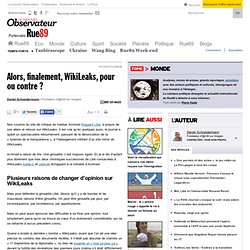
WikiLeaks : une guerre, mais laquelle ? Etrange ironie !
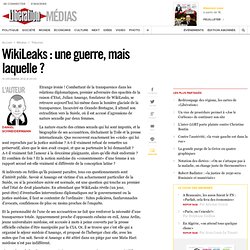
Combattant de la transparence dans les relations diplomatiques, premier adversaire des opacités de la raison d’Etat, Julian Assange, fondateur de WikiLeaks, se retrouve aujourd’hui lui-même dans la lumière glaciale de la transparence. Incarcéré en Grande-Bretagne, il attend son extradition vers la Suède, où il est accusé d’agressions de nature sexuelle par deux femmes. La nature exacte des crimes sexuels qui lui sont imputés, et la biographie de ses accusatrices, déchaînent la Toile et la presse internationale. Que recouvrent exactement les «viols» qui lui sont reprochés par la justice suédoise ? A-t-il vraiment refusé de remettre un préservatif, alors que le sien avait craqué, et que sa partenaire le lui demandait ?
Si indécents ou futiles qu’ils puissent paraître, tous ces questionnements sont d’intérêt public. Et la personnalité de l’une de ses accusatrices ne fait que renforcer la nécessité d’une transparence totale. Ce n’est pas tout. Dans la bataille WikiLeaks : tous fantassins. De la grande bataille WikiLeaks qui vient de s’engager, reconnaissons-le, nous ne sommes que des fantassins myopes, au cœur de la fournaise.
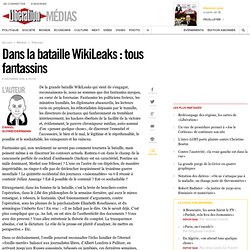
Fantassins les politiciens furieux, les ministres humiliés, les diplomates abasourdis, les lecteurs ravis ou perplexes, les éditorialistes dépassés par le tumulte, les directeurs de journaux qui fanfaronnent en tremblant intérieurement, les hackers éberlués de la facilité de la victoire et, évidemment, le pauvre chroniqueur médias, auto-sommé d’en «penser quelque chose», de discerner l’essentiel et l’accessoire, le bien et le mal, le légitime et le répréhensible, le possible et le souhaitable, les vainqueurs et les vaincus. Fantassins qui, non seulement ne savent pas comment tournera la bataille, mais peinent même à en discerner les contours actuels.
Restera-t-on dans le champ de la cancanerie perfide de cocktail d’ambassade (Sarkozy est un caractériel, Poutine un mâle dominant, Merkel une frileuse) ? Tentons d’énumérer les principaux. 12 Theses on Wikileaks. These 0.
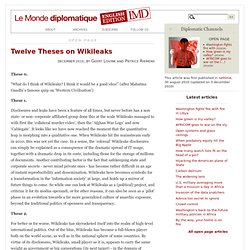
“What do I think of Wikileaks? I think it would be a good idea!” (after Mahatma Gandhi’s famous quip on ’Western Civilisation’) These 1. Disclosures and leaks have been a feature of all times, but never before has a non state- or non- corporate affiliated group done this at the scale Wikileaks managed to with first the ‘collateral murder video’, then the ‘Afghan War Logs’ and now ‘Cablegate’. These 2. For better or for worse, Wikileaks has skyrocketed itself into the realm of high-level international politics. These 3. Democracy 101 NM. Like most of the rest of the world, I've been fascinated by the recent developments in the world of new media.
"New media" is a much-abused phrase, but in the case of Wikileaks, the phrase is literally accurate. Wikileaks really is a new medium: the organisation is less than five years old. This week, courtesy of Wikileaks, we learnt a great deal about the sinews of political and financial power that link the modern internet to the security and executive agencies of the contemporary nation-state. The content of these lessons has much to teach us about the state of our democratic societies.
Interestingly, Wikileaks is not really a "wiki", in the sense that Wikipedia is: it can't be collaboratively edited and it is very far from open access. Nor are its philosophies necessarily original: they are in fact an amalgam of the Enlightenment ideas of Locke, Mill and Paine, and the 1980s and 90s techno-millenarianism of writers such as John Perry Barlow. Who's Afraid Of Wikileaks? As The Guardian's John Naughton has pointed out, there is a delicious irony to the relatively indiscriminate way in which Wikileaks has attacked the sacred cows of the left and the right.
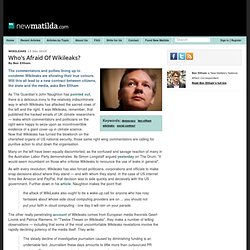
It was Wikileaks, remember, that published the hacked emails of UK climate researchers — leaks which commentators and politicians on the right were happy to seize upon as incontrovertible evidence of a giant cover-up in climate science. Now that Wikileaks has turned the blowtorch on the cherished organs of US national security, those same right wing commentators are calling for punitive action to shut down the organisation. Many on the left have been equally discomforted, as the confused and savage reaction of many in the Australian Labor Party demonstrates. As Simon Longstaff argued yesterday on The Drum, "it would seem incumbent on those who criticise Wikileaks to renounce the use of leaks in general".
The steady decline of investigative journalism caused by diminishing funding is an undeniable fact. Gary's choices - WikiLeaks: America the indispensable. Dr_Tad - the state and hegemony. The First Casualty of Cablegate is Julian Assange’s Theory of Government. London A question left hovering in the air, as Julian Assange returned to a London jail and a realm of silence on Tuesday, is whether the mercurial founder of WikiLeaks has been disappointed to find his conspiratorial view of the world disproved by the very trove of documents he has leaked.
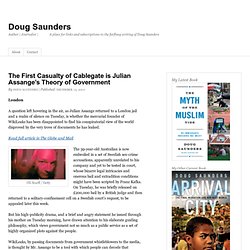
Read full article in The Globe and Mail Oli Scarff / Getty The 39-year-old Australian is now embroiled in a set of Swedish sex-crime accusations, apparently unrelated to his company and yet to be tested in court, whose bizarre legal intricacies and onerous bail and extradition conditions might have been scripted by Franz Kafka. On Tuesday, he was briefly released on £200,000 bail by a British judge and then returned to a solitary-confinement cell on a Swedish court’s request, to be appealed later this week.
Is the Wikileaks we see the Wikileaks we need? The First Casualty of Cablegate is Julian Assange’s Theory of Government. Wikileaks and the Cyberwars to Come. Not such wicked leaks. For the celebrated novelist and intellectual Umberto Eco, the Wikileaks affair or "Cablegate" not only shows up the hypocrisy that governs relations between states, citizens and the press, but also presages a return to more archaic forms of communication.

The WikiLeaks affair has twofold value. On the one hand, it turns out to be a bogus scandal, a scandal that only appears to be a scandal against the backdrop of the hypocrisy governing relations between the state, the citizenry and the press. On the other hand, it heralds a sea change in international communication – and prefigures a regressive future of “crabwise” progress. But let’s take it one step at a time. First off, the WikiLeaks confirm the fact that every file put together by a secret service (of any nation you like) is exclusively made up of press clippings. Embassies have morphed into espionage centres The same goes for secret files. So why so much ado about these leaks?
A real secret is an empty secret.